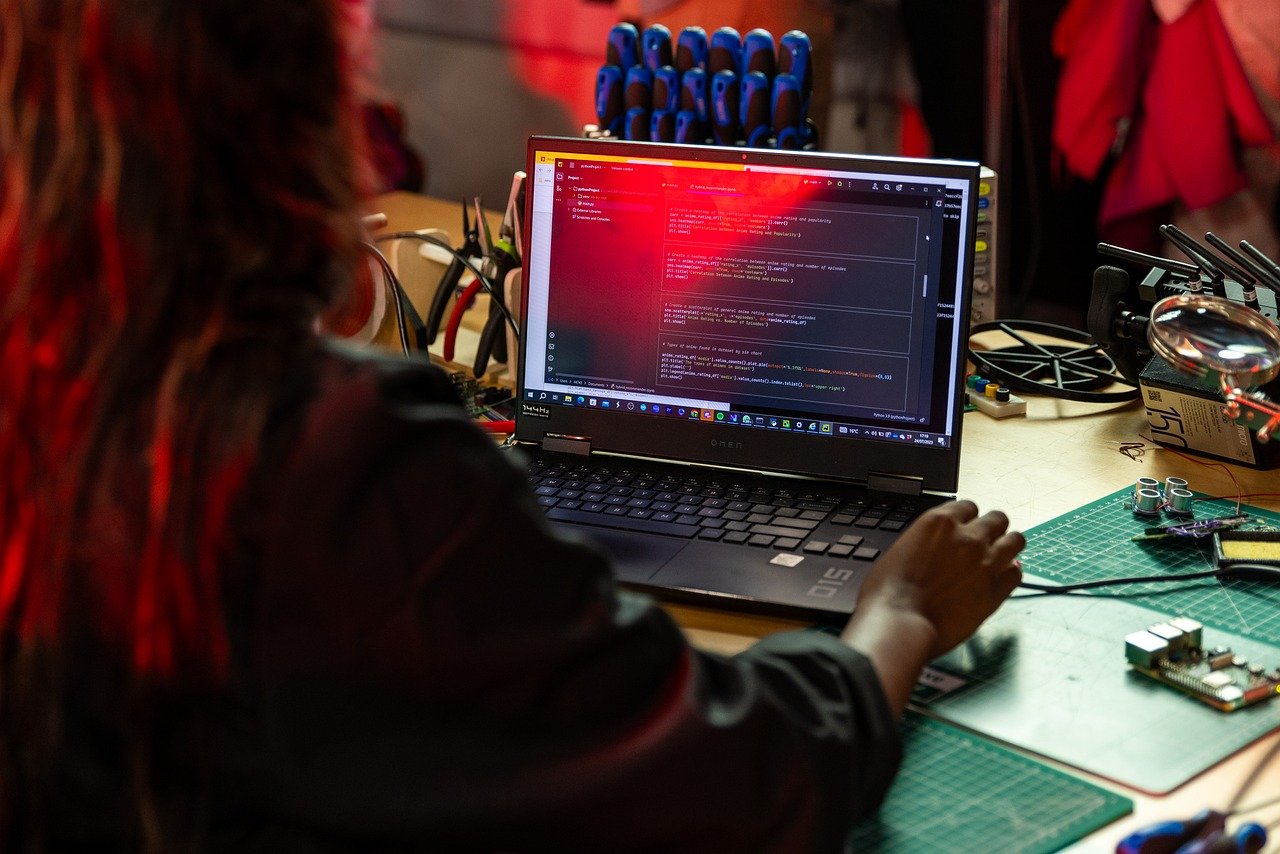How Blockchain is Changing the Nature of Corporate Governance
In today's fast-paced and ever-evolving business landscape, the integration of technology into corporate governance is no longer a luxury but a necessity. One of the most groundbreaking innovations making waves is blockchain technology. Imagine a world where corporate governance is not just about compliance and regulation but also about transparency, accountability, and efficiency. Blockchain has the potential to transform this vision into reality by redefining how organizations operate and how stakeholders interact with them.
At its core, blockchain is a decentralized digital ledger that securely records transactions across multiple computers. This means that once information is recorded, it cannot be altered retroactively without the consensus of the network. This inherent characteristic of immutability is key to enhancing corporate governance practices. It allows for a level of transparency that traditional systems simply cannot provide. Think of it as a glass house—every action taken within the organization is visible to all stakeholders, fostering a culture of trust and accountability.
The implications of blockchain on corporate governance are vast. For one, it enables real-time access to information, allowing stakeholders to stay informed about corporate activities as they unfold. This shift towards real-time data access is revolutionary, as it empowers shareholders, employees, and regulators alike to make informed decisions. Imagine being able to verify the legitimacy of a corporate action or transaction in mere seconds, rather than waiting for quarterly reports or audits. This is the power of blockchain.
Moreover, the introduction of smart contracts—self-executing contracts with the terms of the agreement directly written into code—adds another layer of efficiency. These contracts automate and enforce agreements, ensuring compliance without the need for intermediaries. This not only reduces the risk of disputes but also streamlines the entire governance process. Picture a scenario where a company's compliance with regulations is automatically verified and recorded, eliminating the need for manual checks and balances.
However, while the benefits of blockchain in corporate governance are compelling, it is essential to recognize the challenges it faces. Issues such as scalability and regulatory uncertainty pose significant hurdles. As more organizations look to adopt blockchain solutions, the demand for scalable systems that can handle high transaction volumes becomes critical. Additionally, navigating the inconsistent regulations across jurisdictions can complicate the implementation process. It’s like trying to run a marathon on a track that keeps changing its layout—challenging and exhausting!
In conclusion, blockchain technology is not just a passing trend; it's a transformative force that is reshaping the nature of corporate governance. By enhancing transparency, improving accountability, and streamlining processes, blockchain holds the promise of a more ethical and efficient corporate world. As organizations continue to explore and adopt this technology, the future of corporate governance looks bright, paving the way for a new era of trust and collaboration.
- What is blockchain technology?
Blockchain is a decentralized digital ledger that securely records transactions across multiple computers, ensuring that the information cannot be altered retroactively.
- How does blockchain enhance corporate governance?
Blockchain enhances corporate governance by providing transparency, accountability, and efficiency, allowing stakeholders real-time access to information and reducing the risk of fraud.
- What are smart contracts?
Smart contracts are self-executing contracts with the terms of the agreement directly written into code, automating and enforcing agreements without the need for intermediaries.
- What challenges does blockchain face in corporate governance?
Challenges include scalability issues and regulatory uncertainty, which can hinder the widespread adoption of blockchain technology in corporate governance practices.

Understanding Blockchain Technology
Blockchain technology is often described as a decentralized digital ledger that securely records transactions across multiple computers. This means that once a transaction is recorded, it cannot be altered retroactively without the consensus of the network. Imagine a public library where every book is a transaction; once a book is placed on the shelf, it stays there for everyone to see, but no one can change its content without permission. This inherent immutability and transparency make blockchain a revolutionary tool, especially when applied to corporate governance.
One of the key features of blockchain is its distributed nature. Unlike traditional databases that are managed by a single entity, blockchain operates on a network of computers (or nodes) that share the same data. This decentralization minimizes the risk of data tampering and enhances security. Think of it as a group of friends sharing a secret; if one person tries to change the story, the others will quickly notice and correct it. In a corporate context, this means that all stakeholders can trust the information they receive, as it is verified by multiple sources.
Additionally, blockchain employs advanced cryptographic techniques to ensure that transactions are secure. Each transaction is grouped into a block, and once a block is filled, it is linked to the previous block, forming a chain. This process not only secures the data but also creates a chronological record that is easily traceable. To illustrate this, consider the following table that outlines the key characteristics of blockchain technology:
| Characteristic | Description |
|---|---|
| Decentralization | No single point of control, reducing the risk of corruption. |
| Immutability | Once recorded, transactions cannot be altered. |
| Transparency | All participants can view the same information. |
| Security | Transactions are encrypted and linked to previous transactions. |
In summary, blockchain technology is not just a trend; it represents a fundamental shift in how we approach data management and corporate governance. Its ability to enhance transparency, security, and accountability makes it a compelling solution for modern organizations looking to improve their governance frameworks. As we delve deeper into the implications of blockchain for corporate governance, we will uncover how it can reshape the dynamics between various stakeholders and foster a more ethical and transparent business environment.

Enhancing Transparency in Governance
In the realm of corporate governance, transparency is not just a buzzword; it's a fundamental principle that fosters trust and accountability among stakeholders. Blockchain technology, with its unique attributes, is revolutionizing how organizations operate by enhancing transparency like never before. Imagine a world where every transaction, decision, and agreement is recorded in a way that cannot be altered or hidden. This is precisely what blockchain offers. By providing a decentralized and immutable digital ledger, it allows stakeholders—including shareholders, employees, and regulators—to access real-time information about corporate activities.
One of the most significant advantages of blockchain is its ability to facilitate real-time auditing. Traditional auditing processes can be cumbersome and time-consuming, often leaving room for errors and discrepancies. However, with blockchain, companies can conduct audits in real-time, significantly reducing the time and resources spent on these processes. This not only ensures compliance with regulations but also enhances the overall integrity of financial reporting. Imagine being able to verify transactions instantly—this is the power of blockchain.
Real-time auditing is a game-changer for businesses. Instead of waiting for quarterly or annual audits, organizations can continuously monitor their transactions and operations. This shift not only streamlines the auditing process but also allows for immediate corrections if discrepancies arise. The result? A more robust corporate governance framework that is less prone to errors and fraud. By leveraging blockchain, companies can ensure that their financial statements are accurate and trustworthy, which is critical for maintaining investor confidence.
Instant verification of transactions on the blockchain minimizes discrepancies and fraud, leading to more reliable financial reporting and governance practices. When every transaction is recorded transparently, stakeholders can trust that the information presented to them is accurate. This level of transparency not only builds trust but also encourages more active participation from shareholders and other stakeholders in governance processes.
Moreover, blockchain empowers stakeholders by granting them access to critical data. This accessibility allows them to make informed decisions and engage actively in corporate governance. For instance, shareholders can track how their investments are being utilized, while employees can see how their contributions impact the organization's performance. This level of engagement fosters a sense of ownership and responsibility among all parties involved.
In conclusion, the transparent nature of blockchain is reshaping corporate governance by enhancing trust, accountability, and engagement. As organizations begin to adopt this technology, we can expect to see a shift towards more ethical and responsible governance practices, ultimately benefiting everyone involved.
- What is blockchain technology? Blockchain is a decentralized digital ledger that securely records transactions across multiple computers, ensuring that the data is immutable and transparent.
- How does blockchain enhance transparency in corporate governance? By providing real-time access to information and enabling instant verification of transactions, blockchain fosters trust and accountability among stakeholders.
- What are smart contracts? Smart contracts are self-executing contracts with the terms of the agreement directly written into code, allowing for automated and enforceable agreements on the blockchain.
- What challenges does blockchain face in corporate governance? Challenges include regulatory hurdles, scalability issues, and the need for widespread adoption across different sectors.

Real-Time Auditing
Imagine a world where auditing is not just a periodic chore but a seamless, ongoing process. powered by blockchain technology is making this vision a reality. Traditionally, auditing has been a labor-intensive process, often riddled with delays and discrepancies. However, with the advent of blockchain, organizations can conduct audits in real-time, ensuring that every transaction is recorded and verified instantly. This shift not only saves time but also significantly reduces the resources typically allocated to traditional auditing processes.
One of the most compelling aspects of real-time auditing is its ability to enhance compliance with regulations. In the past, companies would prepare for audits by scrambling to gather documents and data, often leading to last-minute chaos. Now, with blockchain, all necessary information is readily available at any moment. This ensures that organizations can maintain compliance effortlessly, as they are continuously monitored without the stress of impending audits. The transparency of blockchain allows auditors to access a complete and immutable record of transactions, making it easier to verify compliance with financial regulations.
Moreover, the benefits of real-time auditing extend beyond mere compliance. Companies can also leverage this technology to improve their internal controls. By having a real-time view of transactions, management can identify anomalies and address them immediately, rather than waiting for the audit report to reveal issues. This proactive approach can lead to a more robust financial governance framework, ultimately enhancing the overall health of the organization.
To illustrate the impact of real-time auditing, consider the following table that compares traditional auditing processes with blockchain-enabled real-time auditing:
| Aspect | Traditional Auditing | Real-Time Auditing (Blockchain) |
|---|---|---|
| Frequency | Periodic (annually or quarterly) | Continuous |
| Data Accessibility | Requires manual gathering | Instant access to all transactions |
| Compliance Verification | Post-audit checks | Ongoing compliance monitoring |
| Resource Allocation | High (staff, time, costs) | Low (automated processes) |
In summary, real-time auditing powered by blockchain technology is revolutionizing the way organizations approach their financial practices. It not only streamlines the auditing process but also enhances compliance and internal controls, creating a more transparent and accountable corporate governance environment.
- What is real-time auditing? Real-time auditing refers to the continuous monitoring and verification of transactions as they occur, facilitated by blockchain technology.
- How does blockchain improve auditing processes? Blockchain provides an immutable and transparent ledger, allowing auditors to access accurate and up-to-date information instantly, reducing the need for manual data gathering.
- Can real-time auditing help with compliance? Yes, real-time auditing ensures ongoing compliance by continuously monitoring transactions and providing immediate access to relevant data.
- What are the cost implications of real-time auditing? While there may be initial setup costs for blockchain technology, real-time auditing significantly reduces the resources required for traditional auditing processes, leading to long-term savings.

Benefits of Instant Verification
The advent of blockchain technology has revolutionized the way we perceive and conduct transactions, particularly in the realm of corporate governance. One of the standout features of blockchain is its ability to provide instant verification of transactions. Imagine a world where every financial transaction, contract, or agreement is not only recorded but also verified in real-time. This is not just a dream; it’s a reality that blockchain brings to the table. The implications of instant verification are profound, enhancing the reliability of financial reporting and governance practices.
First and foremost, the reduction of discrepancies is a game changer. Traditional methods of transaction verification often involve multiple intermediaries, leading to potential errors and inconsistencies. With blockchain, every transaction is recorded on a decentralized ledger, ensuring that all parties have access to the same, unaltered information. This transparency minimizes the chances of discrepancies, as every entry is time-stamped and immutable. In essence, it’s like having a digital referee that ensures everyone plays by the same rules, eliminating the chances of foul play.
Moreover, instant verification fosters a sense of trust among stakeholders. When shareholders, employees, and regulators can access real-time data, it builds confidence in the organization’s operations. Imagine being able to verify the authenticity of a financial report at the click of a button. No more waiting for quarterly reports or audits to uncover discrepancies; the information is right there, available to anyone who needs it. This level of transparency not only strengthens relationships but also enhances the overall accountability of the organization.
Additionally, the benefits of instant verification extend to fraud prevention. In a world where financial crimes are increasingly sophisticated, having a robust verification system is crucial. Blockchain's architecture inherently reduces the risk of fraud by ensuring that once a transaction is recorded, it cannot be altered or deleted. This is akin to having a vault where every transaction is locked in place, making it virtually impossible for anyone to manipulate the data without detection. As a result, organizations can operate with greater peace of mind, knowing that their transactions are secure and verifiable.
Furthermore, the efficiency gained from instant verification cannot be overlooked. Traditional verification processes can be time-consuming and resource-intensive, often requiring extensive documentation and multiple approvals. Blockchain streamlines this process, allowing organizations to save time and reduce costs associated with transaction verification. This efficiency not only benefits the organizations themselves but also enhances the experience for customers and clients, who can enjoy quicker service and faster resolutions.
In conclusion, the benefits of instant verification through blockchain technology are multifaceted. From reducing discrepancies and enhancing trust to preventing fraud and improving efficiency, the advantages are clear. As organizations continue to explore the potential of blockchain in corporate governance, embracing this technology could be the key to unlocking a new era of transparency and accountability.
- What is blockchain technology?
Blockchain technology is a decentralized digital ledger that securely records transactions across multiple computers, ensuring that the recorded data cannot be altered retroactively. - How does instant verification work in blockchain?
Instant verification in blockchain occurs when transactions are recorded on the ledger in real-time, allowing all stakeholders to access and verify the information immediately. - What are the main benefits of using blockchain for corporate governance?
The main benefits include enhanced transparency, improved accountability, reduced fraud risks, and increased efficiency in transaction verification processes. - Are there any challenges associated with blockchain technology?
Yes, challenges include scalability issues, regulatory hurdles, and the need for widespread adoption among organizations.

Stakeholder Access to Information
The emergence of blockchain technology has revolutionized the way stakeholders access and interact with corporate information. In traditional corporate governance frameworks, information often trickles down through layers of management, creating delays and potential misinformation. However, with blockchain, this paradigm shifts dramatically. Imagine a world where every shareholder, employee, and regulator can access up-to-the-minute information about a company’s operations, decisions, and financial health at the click of a button. This level of transparency not only enhances trust among stakeholders but also empowers them to participate actively in governance processes.
One of the most significant advantages of blockchain is its ability to provide a single source of truth. Unlike conventional systems where data can be altered or manipulated, blockchain records are immutable. This means that once a transaction or decision is logged, it cannot be changed without consensus from all parties involved. As a result, stakeholders can rely on the accuracy of the information they access, which is crucial for making informed decisions. For instance, investors can track the performance of their investments in real-time, while employees can see how their contributions impact the company’s overall success.
Furthermore, the decentralized nature of blockchain allows for a more democratic approach to information sharing. Stakeholders are no longer at the mercy of management to provide updates or reports. Instead, they can access the information directly, fostering a culture of transparency and accountability. This shift not only builds trust but also encourages more active participation in governance. Stakeholders can raise concerns or suggestions based on real data, leading to a more engaged and informed community.
To illustrate the impact of stakeholder access to information, consider the following table that highlights key features and benefits:
| Feature | Benefit |
|---|---|
| Real-time Data Access | Empowers stakeholders to make timely decisions based on current information. |
| Immutable Records | Ensures data integrity, fostering trust among stakeholders. |
| Decentralized Information Sharing | Reduces information asymmetry and promotes a more inclusive governance model. |
In conclusion, the ability for stakeholders to access information through blockchain technology represents a monumental shift in corporate governance. By breaking down barriers and providing real-time, reliable data, blockchain not only enhances transparency but also encourages a more participatory approach to governance. As organizations continue to adopt this technology, we can expect to see a more informed and engaged stakeholder community, ultimately leading to better decision-making and stronger corporate governance.
- What is blockchain technology?
Blockchain is a decentralized digital ledger that securely records transactions across multiple computers, ensuring that the information is immutable and transparent. - How does blockchain improve corporate governance?
Blockchain enhances corporate governance by providing real-time access to information, ensuring data integrity, and promoting accountability among stakeholders. - What are smart contracts?
Smart contracts are self-executing contracts with the terms of the agreement directly written into code, allowing for automated and secure transactions on the blockchain. - Are there challenges to implementing blockchain in corporate governance?
Yes, challenges include regulatory hurdles, scalability issues, and the need for widespread adoption across organizations.

Smart Contracts in Governance
Smart contracts are revolutionizing the way governance operates within corporations. These self-executing contracts, with the terms of the agreement directly written into code, automate and enforce compliance without the need for intermediaries. Imagine a world where agreements are executed automatically once predetermined conditions are met—this is the promise of smart contracts. They not only streamline processes but also minimize the potential for disputes, as the terms are clear and transparent to all parties involved.
One of the most significant advantages of smart contracts in corporate governance is their ability to enhance efficiency. By automating routine tasks, such as compliance checks and payment processing, organizations can save valuable time and resources. This means that executives can focus more on strategic decision-making rather than getting bogged down in administrative tasks. For instance, consider a scenario where a company needs to release funds upon the completion of a project milestone. A smart contract can automatically trigger the payment once the conditions are verified, eliminating delays and ensuring that all parties are held accountable.
Moreover, smart contracts provide a level of transparency that is often lacking in traditional governance structures. Since all transactions are recorded on the blockchain, stakeholders can easily access and verify the execution of contracts. This not only builds trust among shareholders but also encourages active participation in governance. Employees, investors, and regulators can monitor compliance in real-time, fostering a culture of accountability and openness.
However, while the benefits of smart contracts are significant, it’s essential to recognize that they are not a panacea. The effectiveness of smart contracts relies heavily on the quality of the code and the accuracy of the data inputs. If a smart contract is poorly coded or based on inaccurate information, it could lead to unintended consequences. Therefore, organizations must invest in rigorous testing and validation processes to ensure that their smart contracts function as intended.
In summary, smart contracts are a groundbreaking tool in corporate governance that can enhance efficiency, transparency, and accountability. By automating processes and providing clear, accessible records, they empower stakeholders and reduce the potential for disputes. As businesses continue to embrace blockchain technology, the adoption of smart contracts will likely become a cornerstone of effective governance practices.
- What are smart contracts? Smart contracts are self-executing contracts with the terms of the agreement directly written into code, which automatically enforce compliance without intermediaries.
- How do smart contracts enhance corporate governance? They automate routine tasks, improve transparency, and foster accountability by providing verifiable records on the blockchain.
- What are the risks associated with smart contracts? The main risks include potential coding errors and reliance on accurate data inputs, which can lead to unintended consequences if not properly managed.
- Can smart contracts be modified once deployed? Generally, smart contracts are immutable once deployed, which means they cannot be changed. However, some designs allow for upgradability through specific mechanisms.

Improving Accountability
In today's fast-paced corporate world, accountability is not just a buzzword; it is a necessity. With the rise of blockchain technology, organizations are experiencing a radical shift in how they approach accountability. Imagine a world where every decision made within a company is recorded in an unchangeable ledger, accessible to all stakeholders. This is what blockchain brings to the table—a transparent and immutable record of actions that can significantly enhance the accountability of corporate governance.
One of the most compelling aspects of blockchain is its ability to provide a clear audit trail. Every transaction, decision, and action taken by an organization is logged on the blockchain, making it easier to trace back to its origin. This means that if a decision leads to a negative outcome, it’s much simpler to identify who was responsible. No more finger-pointing or shifting blame; accountability becomes a shared responsibility. The transparency offered by blockchain enables stakeholders to hold each other accountable, fostering a culture of trust and ethical behavior within organizations.
Furthermore, blockchain's decentralized nature allows for a more democratic approach to decision-making. Traditional corporate structures often concentrate power in the hands of a few individuals, which can lead to unethical practices and a lack of accountability. With blockchain, decision-making can be distributed across a wider range of stakeholders, ensuring that multiple voices are heard and considered. This decentralization not only promotes fairness but also encourages individuals to take ownership of their contributions, knowing that their actions are recorded and visible to others.
A significant advantage of using blockchain for accountability is its ability to mitigate fraud risks. In an environment where transactions are recorded in real-time and are immutable, the opportunities for fraudulent activities are drastically reduced. Organizations can implement smart contracts that automatically enforce compliance with established rules and regulations. This means that if someone attempts to act unethically, the system can automatically flag the behavior, preventing potential damage before it occurs.
The implications of enhanced accountability are profound. Companies that embrace blockchain technology may find themselves not only improving their internal governance but also enhancing their reputation in the marketplace. Stakeholders, including investors, customers, and employees, are increasingly demanding transparency and ethical behavior from the organizations they engage with. By adopting blockchain, companies can demonstrate their commitment to these values, potentially leading to increased trust and loyalty.
In summary, the integration of blockchain technology into corporate governance practices provides a robust framework for improving accountability. By offering a transparent and immutable record of actions, enabling decentralized decision-making, and significantly reducing fraud risks, blockchain is set to redefine how organizations operate. As we move forward, it will be fascinating to see how companies leverage this technology to foster a culture of accountability and trust.
- How does blockchain enhance accountability in corporate governance?
Blockchain enhances accountability by providing an immutable record of decisions and actions, making it easier to trace responsibility.
- Can blockchain prevent fraud in organizations?
Yes, blockchain significantly mitigates fraud risks by offering a transparent system where all transactions are recorded in real-time.
- What are smart contracts, and how do they relate to accountability?
Smart contracts are self-executing contracts with the terms directly written into code, which enforce compliance and reduce disputes.
- Is decentralized decision-making beneficial for accountability?
Absolutely! Decentralized decision-making reduces the concentration of power, promotes fairness, and encourages individual ownership of decisions.

Decentralizing Decision-Making
Decentralizing decision-making through blockchain technology is akin to transforming a traditional monarchy into a vibrant democracy. In a conventional corporate structure, decisions often rest in the hands of a few executives, leading to potential biases and a disconnect from the broader stakeholder community. However, blockchain introduces a revolutionary approach that distributes authority and empowers individuals at all levels of an organization. Imagine a scenario where every employee, regardless of their position, has a voice in the decision-making process. This is not just a dream; it’s becoming a reality with the advent of blockchain.
The beauty of decentralization lies in its ability to harness collective intelligence. By utilizing blockchain, organizations can create a transparent platform where all stakeholders can propose, discuss, and vote on key decisions. This can be achieved through decentralized applications (dApps) built on blockchain networks, which facilitate communication and collaboration. For instance, consider a company deciding on a new product launch. Instead of solely relying on a board of directors, employees from various departments can contribute insights, feedback, and votes, ensuring that the decision reflects the collective wisdom of the organization.
Moreover, decentralized decision-making reduces the concentration of power, which often leads to corruption and unethical practices. With blockchain's immutable ledger, every decision made is recorded and can be audited, providing a safeguard against manipulation. This transparency not only builds trust among employees but also strengthens the organization’s reputation in the eyes of investors and customers. It’s like having a public scorecard that tracks the organization’s commitment to ethical governance.
However, implementing a decentralized decision-making model does come with its challenges. Organizations must invest in educating their workforce about blockchain technology and how it can be utilized effectively. Additionally, the transition from a centralized to a decentralized model may meet resistance from those who are accustomed to traditional hierarchies. Yet, the long-term benefits—such as increased innovation, enhanced employee engagement, and improved decision quality—far outweigh these initial hurdles.
In conclusion, decentralizing decision-making through blockchain not only democratizes the governance process but also fosters a culture of inclusivity and accountability. As organizations continue to explore the potential of blockchain, it is crucial to embrace this shift towards a more distributed model of governance. After all, when everyone has a seat at the table, the decisions made are not just for the few, but for the many.
- What is decentralization in corporate governance?
Decentralization in corporate governance refers to distributing decision-making authority across various levels of an organization, rather than centralizing it in a small group of executives. - How does blockchain facilitate decentralization?
Blockchain enables secure, transparent, and immutable recording of decisions, allowing all stakeholders to participate in the governance process and ensuring accountability. - What are the benefits of decentralized decision-making?
Benefits include enhanced trust among stakeholders, increased innovation, and a more ethical governance structure, as decisions are made collectively rather than by a select few. - What challenges might organizations face when adopting decentralized governance?
Challenges include resistance to change, the need for education on blockchain technology, and ensuring that all stakeholders are engaged in the decision-making process.

Mitigating Fraud Risks
Fraud is a pervasive issue in the corporate world, often undermining trust and leading to significant financial losses. One of the most compelling advantages of blockchain technology is its ability to mitigate fraud risks effectively. By leveraging the inherent characteristics of blockchain, organizations can create a secure environment that minimizes opportunities for fraudulent activities. Imagine a world where every transaction is recorded in a way that cannot be altered or erased—this is the essence of blockchain. The technology operates on a decentralized network, meaning that no single entity has control over the entire ledger, which significantly reduces the risk of manipulation.
Moreover, the transparent nature of blockchain allows stakeholders to monitor transactions in real-time. This transparency acts as a powerful deterrent against fraudulent behavior; when individuals know their actions are being recorded and can be audited at any time, they are less likely to engage in unethical practices. For instance, consider a scenario where a company's financial records are stored on a blockchain. Any attempt to falsify these records would be immediately apparent to all stakeholders, as the original data remains intact and accessible.
Another crucial aspect of fraud mitigation through blockchain is the use of smart contracts. These self-executing contracts automatically enforce and verify the terms of an agreement without the need for intermediaries. By automating processes and ensuring that all parties adhere to the agreed-upon terms, smart contracts significantly reduce the chances of fraud. For example, in a supply chain scenario, a smart contract can ensure that payment is only released once goods have been delivered and verified, creating a secure transaction environment.
Additionally, organizations can implement a multi-signature approach on blockchain transactions. This means that multiple parties must approve a transaction before it is executed, adding an extra layer of security. This method not only enhances accountability but also makes it considerably more difficult for any single individual to commit fraud without detection.
To summarize, the integration of blockchain technology into corporate governance can profoundly impact fraud prevention strategies. By ensuring transparency, utilizing smart contracts, and adopting multi-signature protocols, organizations can create a robust framework that effectively mitigates fraud risks. The result is not just a safer corporate environment but also a renewed sense of trust among stakeholders, paving the way for more ethical business practices.
- What is blockchain technology? Blockchain is a decentralized digital ledger that securely records transactions across multiple computers.
- How does blockchain enhance transparency? It allows stakeholders to access real-time information about corporate activities, fostering trust and accountability.
- What are smart contracts? Smart contracts are self-executing contracts with the terms of the agreement directly written into code, automating and enforcing compliance.
- Can blockchain completely eliminate fraud? While blockchain significantly reduces fraud risks, it cannot entirely eliminate them. However, it provides a more secure environment for transactions.
- What challenges does blockchain face in corporate governance? Key challenges include regulatory hurdles, scalability issues, and the need for widespread adoption.

Challenges and Limitations
While blockchain technology offers a plethora of benefits for corporate governance, it is not without its . As companies look to integrate this innovative technology into their governance frameworks, they must navigate a complex landscape filled with obstacles that could hinder its successful implementation. One of the primary concerns is regulatory uncertainty. Different jurisdictions have varying regulations regarding blockchain, and the lack of a unified legal framework can create confusion and hesitation among organizations. Companies may find themselves in a precarious position, unsure of how to comply with existing laws while trying to innovate.
Another significant challenge is scalability. As more organizations adopt blockchain, the demand for transaction processing increases. Many blockchain networks struggle with high transaction volumes, leading to slower processing times and higher costs. This bottleneck can undermine the efficiency that blockchain promises, making it less appealing for large-scale corporate governance applications. For instance, if a company experiences a surge in transactions during a critical period, the network might not handle the load effectively, resulting in delays that could impact decision-making.
Moreover, the need for widespread adoption poses another hurdle. For blockchain to truly revolutionize corporate governance, all stakeholders—from shareholders to regulators—must be on board. This requires a cultural shift within organizations and industries, as many are still accustomed to traditional governance practices. The transition to blockchain-based governance is not merely a technological upgrade; it’s a fundamental change in how organizations operate. This can lead to resistance from those who fear the unknown or who are comfortable with the status quo.
In addition to these challenges, companies must also consider the technical expertise required to implement and maintain blockchain systems. The technology is still relatively new, and finding professionals with the necessary skills can be a daunting task. Organizations may need to invest significantly in training or hiring new talent, which can strain resources, particularly for smaller companies.
Despite these challenges, the potential of blockchain technology in improving corporate governance cannot be overlooked. Companies willing to tackle these obstacles head-on may find themselves at the forefront of a governance revolution. As the landscape continues to evolve, it will be essential for organizations to stay informed and adaptable, ensuring they can leverage the benefits of blockchain while mitigating its limitations.
- What are the main challenges associated with blockchain in corporate governance? The main challenges include regulatory uncertainty, scalability issues, the need for widespread adoption, and the requirement for technical expertise.
- How does regulatory uncertainty affect blockchain implementation? Inconsistent regulations across different jurisdictions can create confusion and hesitation, making it difficult for companies to comply while innovating.
- Why is scalability a concern for blockchain networks? High transaction volumes can lead to performance bottlenecks, slowing down processing times and increasing costs, which can impact the effectiveness of corporate governance applications.

Regulatory Hurdles
When it comes to implementing blockchain technology in corporate governance, one of the most significant challenges lies in navigating the complex web of . Each country has its own set of rules and guidelines that govern corporate operations, and these can vary widely. As a result, companies looking to adopt blockchain must grapple with inconsistent regulations that can impede progress. For instance, while some jurisdictions may embrace blockchain with open arms, others may impose stringent restrictions that stifle innovation.
Moreover, the rapid evolution of blockchain technology often outpaces the regulatory frameworks that are meant to govern it. This disconnect can create a regulatory uncertainty that leaves organizations hesitant to fully commit to blockchain solutions. They may wonder, "What if the rules change tomorrow?" This uncertainty can lead to a reluctance to invest in blockchain, even when its potential benefits are clear.
To illustrate the regulatory landscape, consider the following table that summarizes the regulatory approaches of different regions:
| Region | Regulatory Approach | Impact on Blockchain Adoption |
|---|---|---|
| North America | Mixed; some states are favorable, while others are restrictive | Encourages innovation but creates confusion |
| Europe | Generally supportive, with GDPR considerations | Facilitates adoption but requires compliance |
| Asia | Varies widely; some countries are blockchain-friendly, others are not | Creates a fragmented market |
In addition to these regional differences, companies also face the challenge of compliance costs. Adhering to various regulations can be expensive and time-consuming. Organizations may need to hire legal experts or consultants to ensure they are meeting all necessary requirements, which can divert resources away from other critical areas of the business. This is particularly concerning for smaller companies that may not have the same financial flexibility as larger corporations.
Ultimately, addressing these regulatory hurdles is crucial for the successful integration of blockchain into corporate governance. It requires collaboration between industry stakeholders and regulators to create a more harmonized regulatory environment. Only then can organizations fully leverage the transformative potential of blockchain technology without the fear of falling foul of the law.
- What are the main regulatory challenges of blockchain? The main challenges include inconsistent regulations across jurisdictions, rapid technological evolution outpacing regulatory frameworks, and compliance costs.
- How can companies navigate regulatory hurdles? Companies can navigate these hurdles by staying informed about regulatory changes, engaging with legal experts, and participating in industry advocacy for clearer regulations.
- Is blockchain technology fully regulated? No, blockchain technology is not fully regulated, and the regulatory landscape is still evolving.

Scalability Issues
When we talk about scalability in blockchain technology, we're diving into one of the most pressing challenges that this innovative system faces. Essentially, scalability refers to the ability of a blockchain network to handle an increasing number of transactions without compromising performance. Imagine a highway that can only accommodate a certain number of cars at a time; if too many vehicles try to merge onto it, traffic jams ensue. Similarly, as more users and transactions flood into a blockchain network, the system can become sluggish, leading to delays and inefficiencies.
One of the primary reasons for these scalability issues is the structure of many existing blockchain networks, which often rely on a consensus mechanism known as Proof of Work (PoW). This method, while secure, is resource-intensive and limits the number of transactions that can be processed simultaneously. For instance, Bitcoin, one of the most well-known blockchains, can only handle about 7 transactions per second, a stark contrast to traditional payment systems like Visa, which can process over 24,000 transactions per second.
To illustrate the impact of scalability on corporate governance, let’s consider a hypothetical scenario:
| Scenario | Traditional System | Blockchain System |
|---|---|---|
| Number of Transactions | 100,000 | 100,000 |
| Time to Process | 2 hours | 5 hours (due to congestion) |
| Cost of Processing | $500 | $1,500 (due to fees during high demand) |
As seen in the table, while both systems have the same number of transactions, the blockchain system takes significantly longer to process and incurs higher costs during peak times. This can be detrimental for corporations that rely on timely and cost-effective transaction processing to maintain competitive advantage and operational efficiency.
Moreover, scalability issues can lead to increased transaction fees, which can further deter users from utilizing blockchain for corporate governance. When costs rise, companies may hesitate to adopt blockchain solutions, fearing that the initial promise of efficiency and cost savings could turn into a financial burden. To address these concerns, various solutions are being explored, including:
- Layer 2 Solutions: These are built on top of existing blockchains and can handle transactions off-chain, thus reducing the load on the main network.
- Sharding: This approach divides the blockchain into smaller, more manageable pieces, allowing for parallel processing of transactions.
- Alternative Consensus Mechanisms: Shifting from PoW to less resource-intensive methods like Proof of Stake (PoS) can significantly improve transaction speeds and reduce energy consumption.
In conclusion, while blockchain holds immense potential for transforming corporate governance, its scalability issues pose significant challenges that need to be addressed. As technology evolves and solutions are implemented, we may see a future where blockchain can seamlessly integrate into corporate structures, enhancing efficiency and transparency without the bottlenecks that currently hinder its widespread adoption.
- What is blockchain scalability? Scalability in blockchain refers to the network's ability to handle an increasing number of transactions efficiently.
- Why is scalability important for corporate governance? Scalability ensures that blockchain can support the transaction volume required for effective corporate governance without delays or increased costs.
- What are some solutions to scalability issues? Solutions include Layer 2 solutions, sharding, and alternative consensus mechanisms like Proof of Stake.
Frequently Asked Questions
-
What is blockchain technology?
Blockchain technology is a decentralized digital ledger that securely records transactions across multiple computers. It ensures that once data is recorded, it cannot be altered retroactively, which enhances trust and transparency in various applications, including corporate governance.
-
How does blockchain enhance transparency in corporate governance?
Blockchain enhances transparency by allowing stakeholders to access real-time information about corporate activities. This visibility fosters trust among shareholders, employees, and regulators, as everyone can see the same information simultaneously, reducing the chances of misinformation.
-
What are smart contracts and how do they work?
Smart contracts are self-executing contracts with the terms of the agreement directly written into code on the blockchain. They automatically enforce and execute the terms when predefined conditions are met, reducing the need for intermediaries and minimizing disputes.
-
How does blockchain improve accountability in organizations?
Blockchain improves accountability by providing an immutable record of all decisions and actions taken within an organization. This traceability makes it easier to hold individuals accountable for their actions, as every transaction is permanently recorded and can be audited at any time.
-
What challenges does blockchain face in corporate governance?
Some challenges include scalability issues, where high transaction volumes can slow down the network, and regulatory hurdles, as inconsistent regulations across different jurisdictions can complicate the adoption of blockchain technology in governance practices.
-
Can blockchain help mitigate fraud in corporate governance?
Yes, blockchain helps mitigate fraud risks by providing a secure and transparent system where all transactions are recorded and visible to authorized parties. This transparency makes it much harder for fraudulent activities to go unnoticed, promoting ethical practices within organizations.



















